The Rings of Power episode 6 recap: an epic and shocking series-defining spectacle
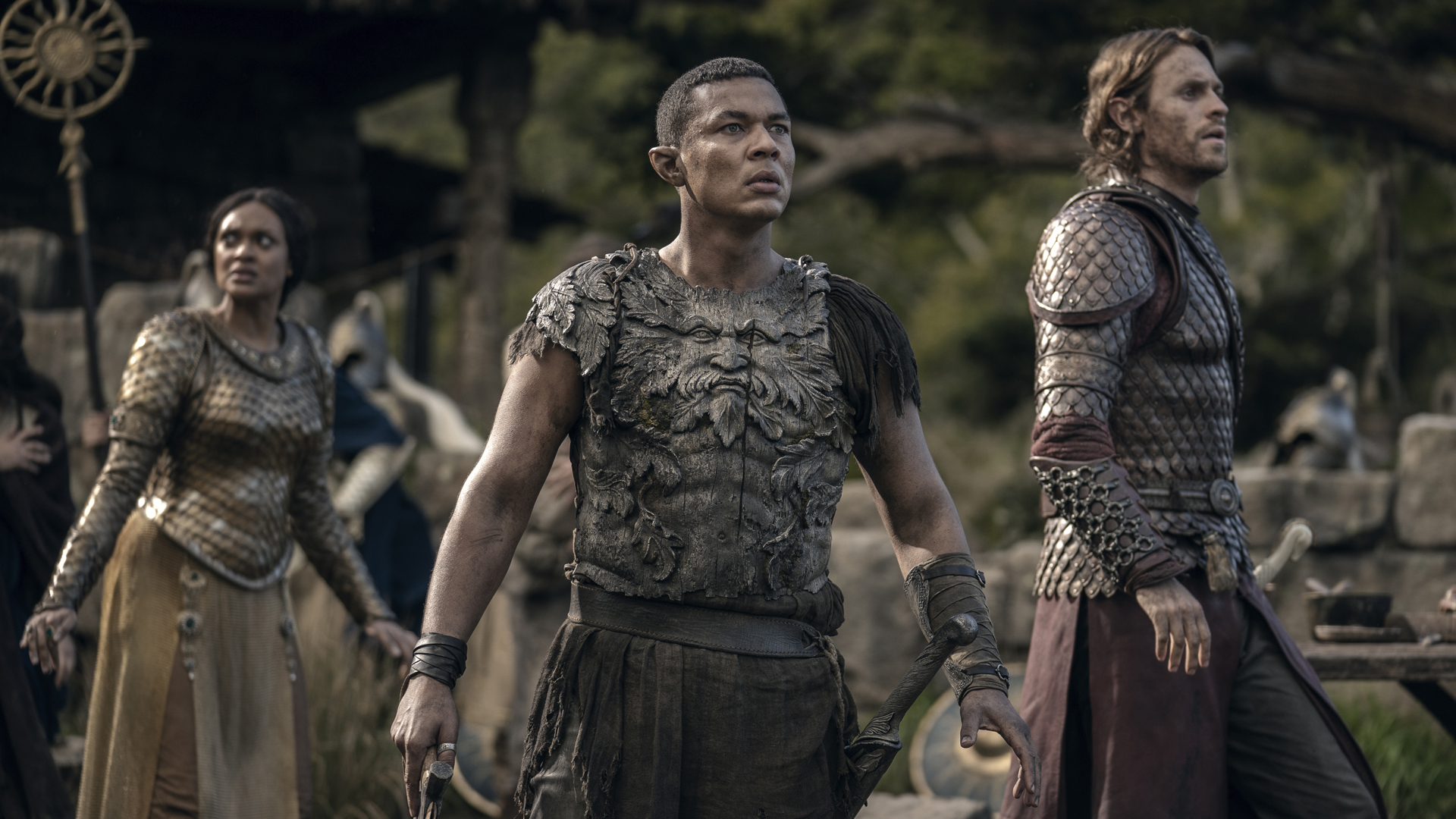
Sign up for breaking news, reviews, opinion, top tech deals, and more.
You are now subscribed
Your newsletter sign-up was successful
- Episode 6 (of 8), 'Udûn'
- Written by Nicholas Adams, Justin Doble, J.D. Payne, and Patrick McKay
- Directed by Charlotte Brändström
★★★★★
Full spoilers follow for The Rings of Power episodes 1 to 6.
The Rings of Power has made for a dramatically compelling, emotionally wrought, and occasionally lore expansive watch so far. However, the Prime Video show has been lacking in a few key areas – namely, in the action, shock value, and plot pacing departments.
All of those criticisms are blown away (and then some) in Udûn, the high fantasy series' sixth episode in stunning and spectacular fashion. It's an entry packed with entertaining and complex set-pieces, gratuitous violence that Game of Thrones would be proud of, and a jaw-dropping ending that paves the way for two tantalizing final episodes before season 1 draws to a close.
In essence, The Rings of Power episode 6 is the series-defining entry Amazon's Lord of the Rings TV adaptation needed – and it's one that'll make even the most critical Tolkien fan sit up and take notice.
A tale of three traps
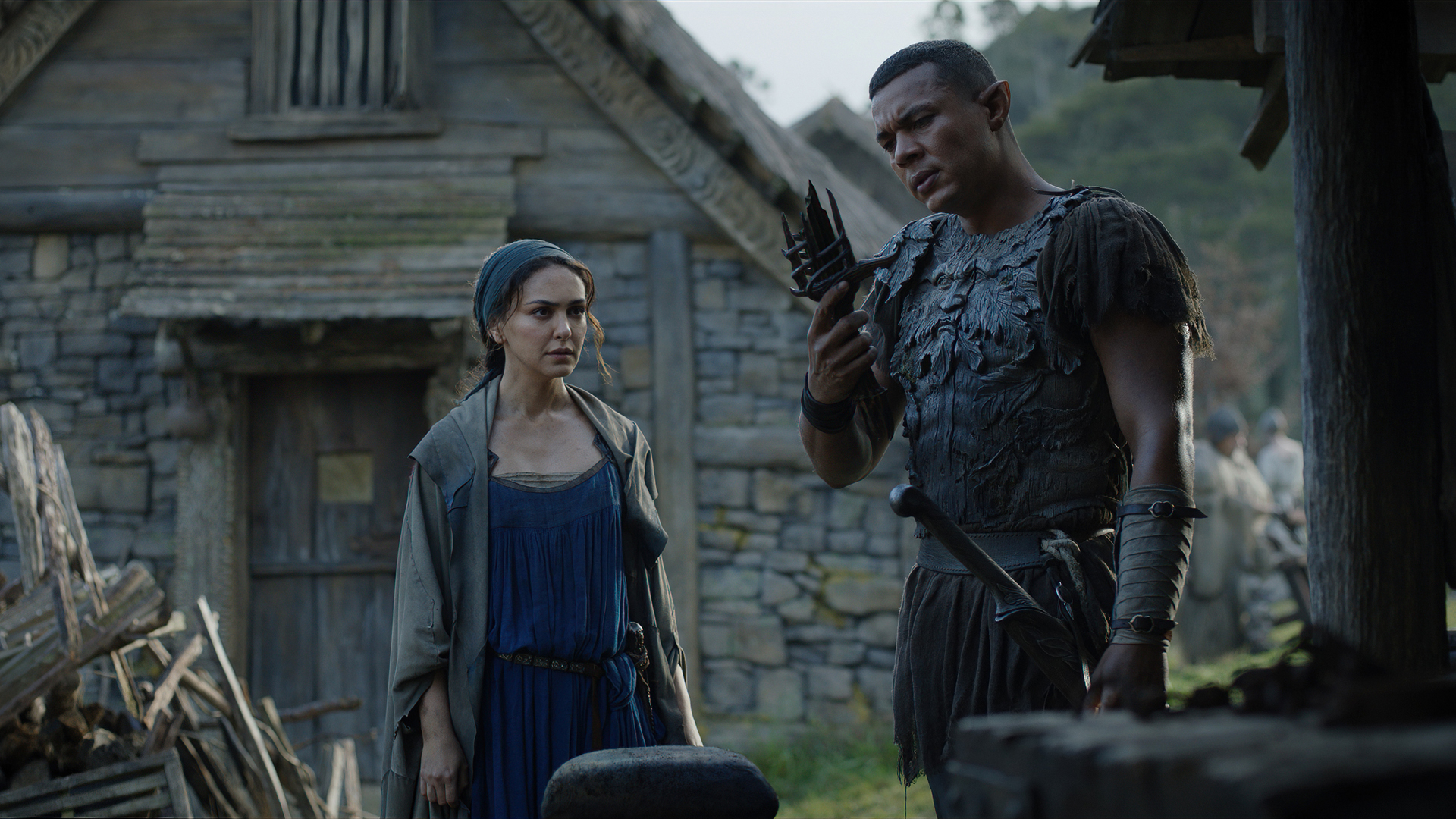
In a first for the show, the entirety of Udûn takes place in one location, i.e. the Southlands, and sees two key storylines – the Númenorean and Southlander arcs – collide. It's a highly satisfying creative decision, with the sixth entry's singular narrative providing an episodic focal point that makes for a more cohesive and thrilling tale.
Under the cover of darkness, Adar leads his orc army to Ostirith, the elven watchtower where the opposing Southlanders have sought refuge. Upon arrival, though, his forces find the outpost abandoned. As they search for anyone hiding, Arondir launches a surprise attack, felling some orcs before he brings down Ostirith's watchtower using a flaming arrow, which destroys the ropes holding the landmark together. The collapsing tower kills many enemies and sends the others scattering, much to the Southlanders' delight, who watch from a safe distance.
Meanwhile, on the Númenorean ships heading to Middle-earth to aid the Southlanders, a restless Isildur runs into Galadriel on the vessel's deck after tending to his horse. The duo engage in a touching conversation that offers an insight into how the death of Isildur's mother has affected him. It's a simple but delightful moment that shows how episode 6's merging storylines might similarly play out in future seasons, allowing more characters to interact with those they're yet to meet. However, Elendil's arrival interrupts the pair's chat and, when Galadriel inquires how Isildur's mom died after Isildur takes his leave, Elendil responds: "She drowned". At least now we know.
Sign up for breaking news, reviews, opinion, top tech deals, and more.
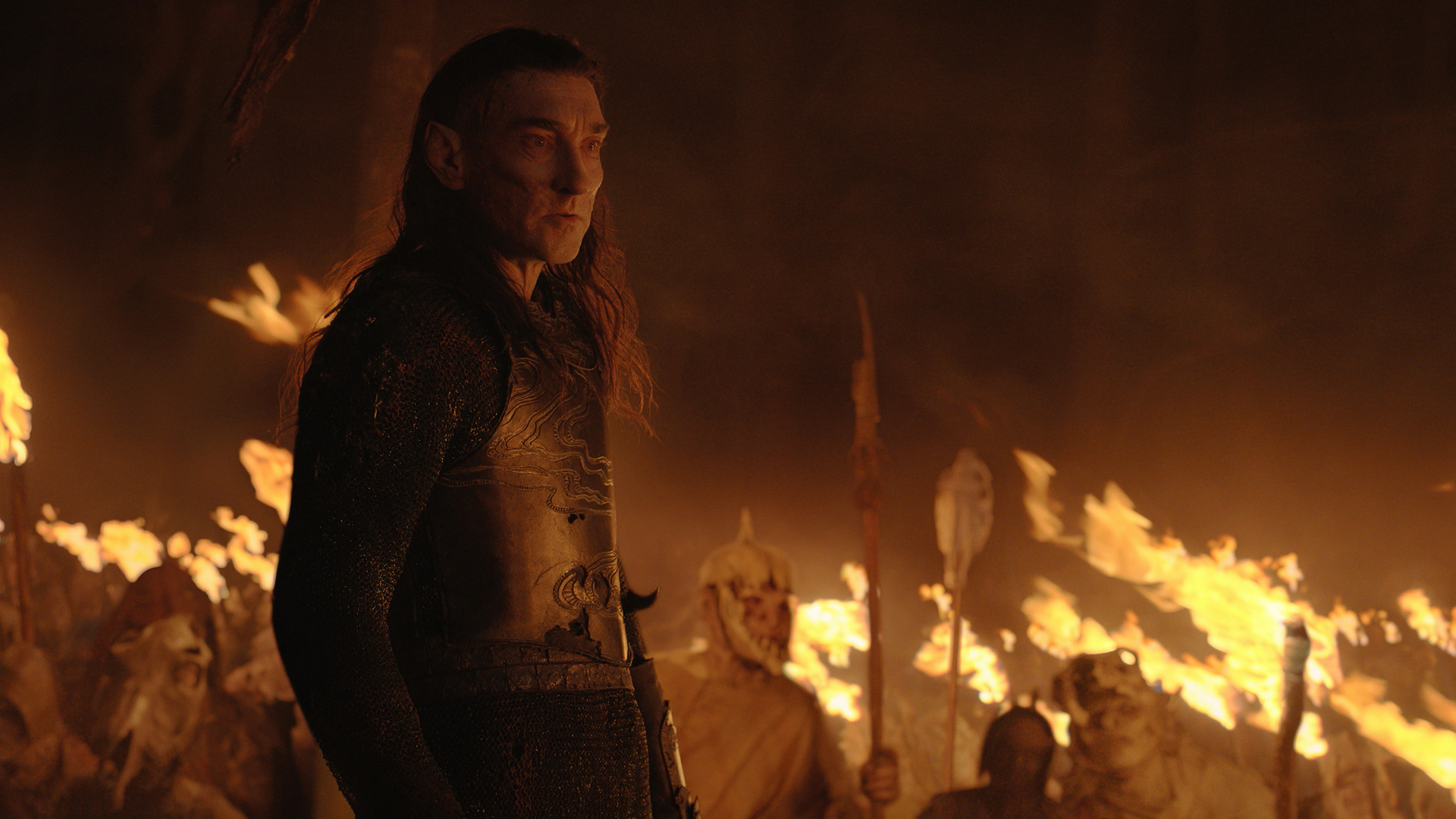
Regrouping with Bronwyn and company, Arondir – who unsuccessfully tries to destroy the evil sword Theo found – helps the defenders prepare Tirharad for a second wave of orcs. Before the impending attack, Arondir and Bronwyn share a quiet, romance-laden moment centered on the significance of alfirin seeds, which elves traditionally plant on the eve of battle so that new life can grow "in defiance of death". Interestingly, Adar conducted a similar ritual in the episode's opening scene. Is this a sign that he's potentially redeemable? Or just that he holds onto his old elven heritage despite his corrupted turn? In our view, certainly the latter.
As night falls, Adar sends another garrison to attack the Southlanders – a suitably tension-fuelled scene that acts as a mini-Helm's Deep-like sequence (complete with Bear McCreary's creeping score) from The Two Towers. Unbeknownst to them, the humans have planned a second ambush, penning the orcs into the village square with flaming carts before Arondir leads some Southlander archers in downing their foes with a volley of arrows.
Unlike their first surprise attack, though, the Southlanders' second plan quickly falls apart. The orcs turn the tables on the defenders, killing some with their own arrow-based riposte and breaking through the fire cart line to head to the village tavern, where the Southlands' old and young are assembled.
Multiple skirmishes break out as the Southlanders defend their positions, with frenetic close-quarters combat ensuing between the two sides. Arondir engages a giant orc, who quickly overpowers the elf and, after pinning the bloodied and disoriented Arondir to the well outside the tavern, seems set to kill him. Not even a makeshift wooden dagger to the eye stops the orc, whose black, oozing blood drips menacingly onto Arondir's face as he prepares to deliver the telling blow using the same stopgap weapon on the struggling elf.
Luckily, Bronwyn arrives and kills the orc brute before it can finish off Arondir, a symbolic moment that reflects how the townsfolk have survived by the skin of their teeth.
Their celebrations are short-lived, though. Shockingly, it's revealed that many of the 'orcs' – disguised by bone armor and dirty cloaks – were the Southlanders who left with turncoat Waldreg to join Adar's army in episode 5, meaning Bronwyn and company have just killed their own kind. It's a heart-wrenching scene, but Arondir and the Southlanders don't have time to take stock of what's just gone down.
Springing an ambush of their own, Adar's orcs murder many Southlanders in a hail of arrows while severely injuring others – Bronwyn and Tredwill included. Other orcs rush from the treeline as the remaining Southlanders (and Arondir) retreat to the safety of the tavern. Inside, Tredwill succumbs to his injuries, while Arondir and Theo use the remaining alfirin seeds to seal Bronwyn's wounds to stop her bleeding out. The resulting 'Bronwyn is dead' fake out is a bit unnecessary, but it's a minor criticism that can be overlooked in the context of an emotionally impactful scene.
Charge of the light brigade
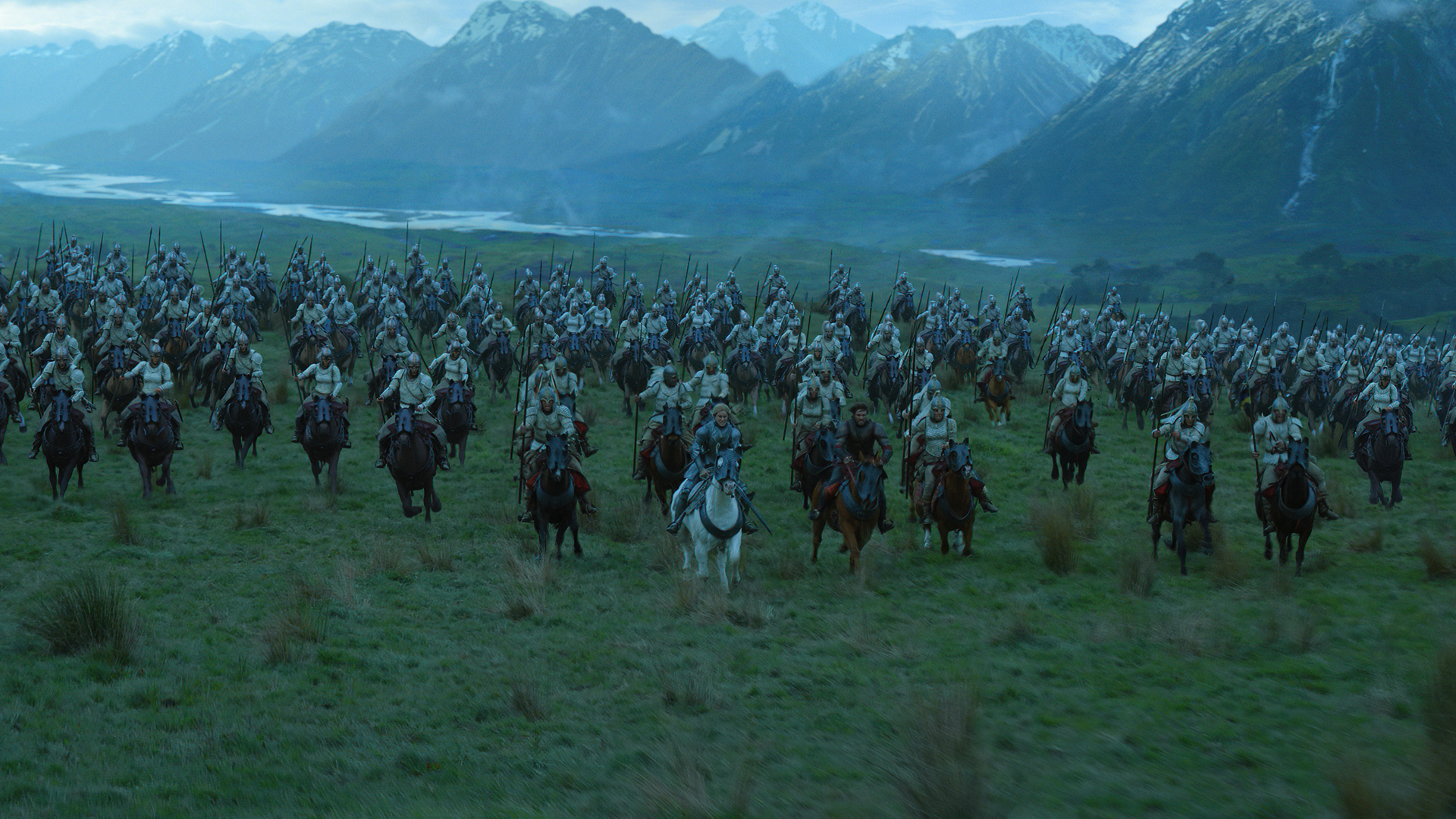
With little in the way of resistance, Adar and his forces breach the tavern, seize Arondir and Theo (so they can't fight back) and demand the Southlanders hand over the evil sword. Arondir refuses, leading Adar to command his orcs to start slowly and brutally killing those left alive. It makes for harrowing viewing and, in some ways, makes a mockery of naysayers who claim The Rings of Power isn't a distressing, gratuitously violent show on occasion.
It's not until Bronwyn is threatened that Theo agrees to hand the hilt over, much to Arondir's dismay. Apologizing to the elf, Theo reveals the sword handle's hiding place, which an emotional Adar recovers it from. Similar to the bait and switch nature of Bronwyn's seeming death, it's a scene that's a bit curious, given that Arondir told Bronwyn that he'd be the only one who would know where Arondir has hidden the hilt. Seeing that Theo knows where it is, then, is a slight narrative misstep. Again, though, it's a small issue that can be forgiven in the context of the episode.
Episode 6 is the series-defining entry Amazon's Lord of the Rings TV adaptation needed
Just as Adar prepares to celebrate – and hand Waldreg a new mission – the tables turn yet again.
Having raced to Tirharad, Galadriel and the Númenoreans ride through the village, sweeping all before them. Invigorated by the sound of their saviors' thundering hooves, Tirharad's populace fights back inside the tavern, overwhelming their orc oppressors.
The action is hard-fought, frantic, energetic, and satisfyingly choreographed. That's to be expected for a show of this scale and scope, but it's no less thrilling and packed with stand-out moments. Galadriel's effortless Ukrainian Cossack-style riding, Halbrand and Isildur coming to Elendil's rescue, and the subtle references – albeit on a smaller scale – to that Helm's Deep cavalry charge are three such engrossing instances. The Rings of Power has taken its time to deliver a grand set-piece for fans to marvel at, so it's fantastic to see episode 6 do so in such striking fashion.

A brief encounter between Galadriel and Arondir follows, with the former (and Halbrand) giving chase to Adar after Arondir alerts him to the sword hilt. One tense forest-based pursuit sequence later and the duo combine to bring Adar's horse down and take the former elf captive. Well, once Galadriel stops Halbrand from killing Adar after the latter goads the former, anyway.
The Southlanders and Númenoreans celebrate a job well done, with many of the two storylines' major characters finally mingling to pleasing effect. That includes Galadriel and Adar, who engage in a bitter and suspense-filled conversation about the darkness each carries within them; a scene superbly accentuated by director Charlotte Brändström's effective use of dutch tilt cinematography. Of equal intrigue is Adar's revelation that he's what's known as an Uruk – a First Age elf who was kidnapped and tortured by Morgoth, Sauron's master, before Adar helped to create the orcs. It's an intriguing reference to the Uruk-Hai from The Lord of the Rings trilogy, and likely one that long-time Tolkien fans might bristle at.
Anyway, Adar reveals that Sauron planned to devote himself to healing Middle-earth, with the dark lord wanting to "unite" all races under his tyrannical rule. Sauron experimented on orcs with an unseen kind of dark magic, but failed to make a breakthrough. Even so, the countless orc lives he threw away in pursuit of his goals alienated Adar, who says he killed Sauron – sure, we believe you, Adar – and led his orc followers to the Southlands to make it their new home.
In a role reversal from earlier, Halbrand appears before an increasingly hot-headed Galadriel moves to kill Adar for his ongoing provocations. The duo head off to a nearby stream and engage in a heart-to-heart; one seemingly dripping with sexual tension before they're interrupted by a Númenorean soldier.
A new region rises
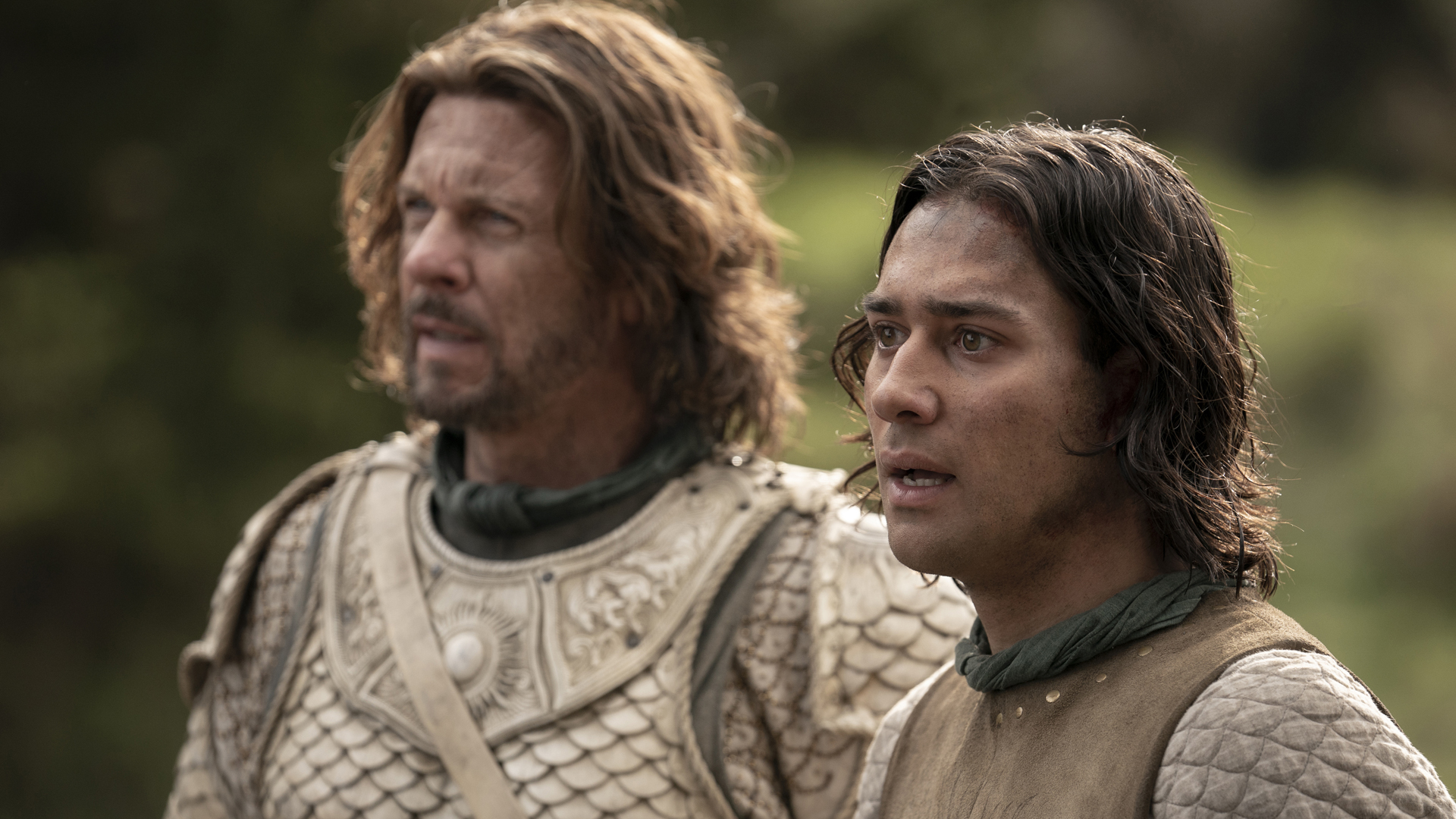
Back at camp, an amiable first conversation between Queen Míriel and Bronwyn makes way to Halbrand revealing his true identity to the Southlanders, who cheer at their king-in-waiting's overdue return.
Bu there's one final sting in the tail. After a father-son style chat between Arondir and Theo, the former gives the sword hilt to the latter. Arondir tells Theo the only way he'll be free of its influence is if he gives it to the Númenoreans to drop to the bottom of the ocean when they head home.
However, when Theo unwraps the blanket the handle is wrapped in, he's startled to see it's been replaced by an ordinary axe. Oh, Adar, you sly dog.
Galadriel and Adar's tense verbal back and forth is accentuated by director Charlotte Brändström's effective use of dutch tilt cinematography
We jump cut to Waldreg – a fun piece of juxtaposition, given the previous scene involving Theo, who also wielded the sword and nearly succumbed to its power – we see the Southland traitor using his blood to craft a new blade from the sword's handle. He plunges it into the ground – remember earlier in the episode when Adar saw the rock formation of the sword and Sauron's helm? Yeah, that's significant here – and turns it like a key, unlocking part of the Ostilith dam overlooking the Southlands.
Water rushes through the valley, interrupting a heart warming chat between Isildur and Elendil as it does so. Earthquakes begin to shake the Southlands as the gushing water travels through the tunnels dug by the orcs towards the mountains, where it meets a colossal lava pool inside a dormant volcano. The concentrated steam pressure causes the volcano to erupt, spewing fiery rocks that rain down on the Númenoreans and Southlanders. Those not killed by the falling debrief are forced to seek refuge from, or soon engulfed by, the rapidly approaching, storm-fuelled ash cloud.
Except for Galadriel, that is. Paralyzed by shock, the elven commander simply stands in place as the ash cloud approaches, overwhelming her (and the camera) as the camera cuts to black. Welcome to Mordor, everyone.
Our verdict
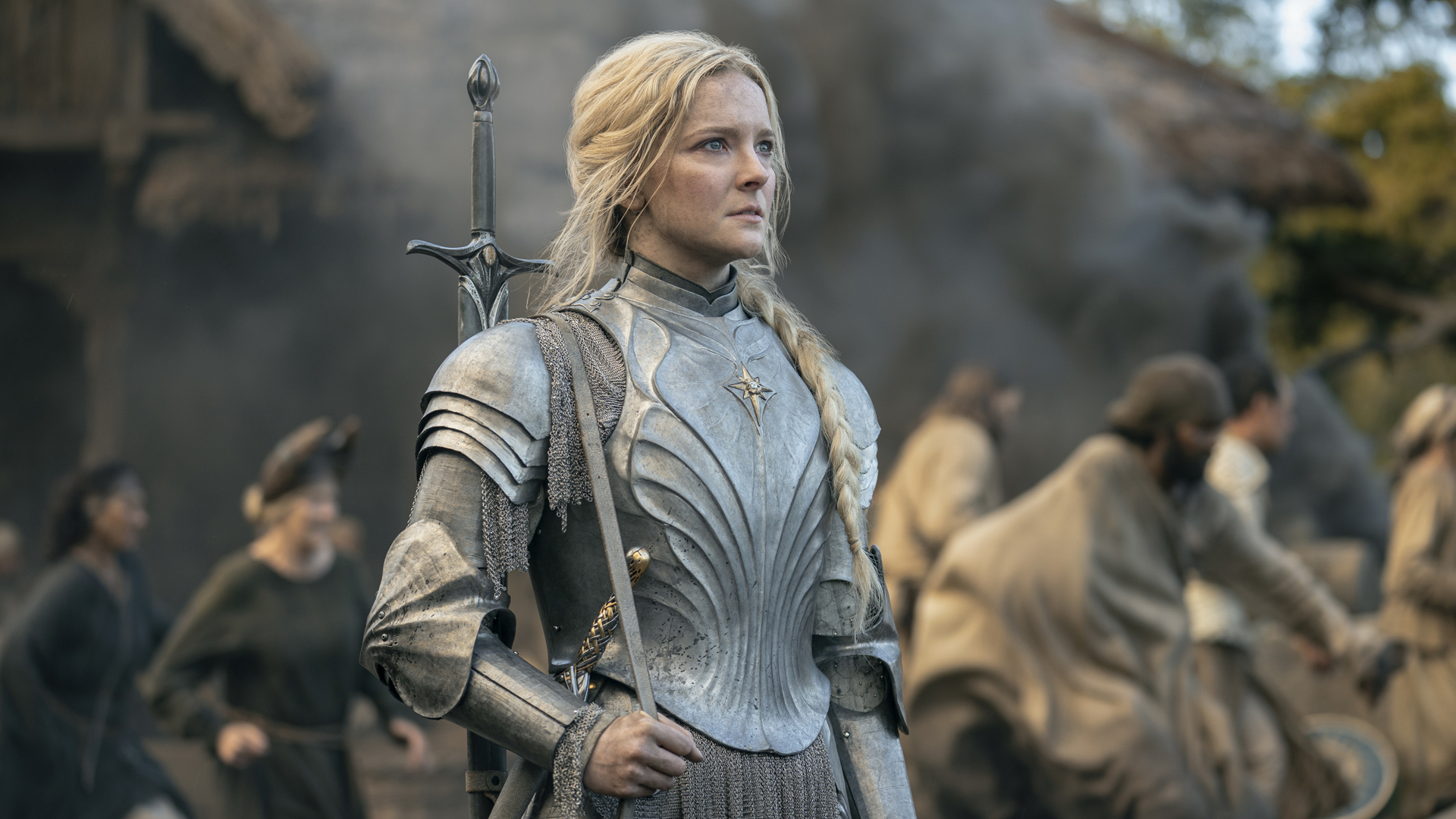
The Rings of Power episode 6 is the series' most thrilling, triumphant, and torturous installment yet. After five weeks of waiting, Amazon's Lord of the Rings TV show delivers a number of visually spectacular set-pieces, with every one sure to make the hairs on the back of your neck stand on end.
Udûn marries these sequences expertly with the engrossing drama and more intimate moments we've come to expect from the franchise, too, while each major player gets their chance to shine, whether it's in action or verbal capacity. Put together, it makes for a highly pleasing equilibrium across all aspects of its narrative and overall production.
Its ending is sure to be divisive – previously loose interpretations of Tolkien's iconic source material have been so among diehard fans – but, frankly, who cares? It's a momentous event for the show's overarching plot and Middle-earth's history, and one that'll have major repercussions moving forward.
There are episodes in a show's lifespan that define how they're viewed through a prestige-style TV lens for years and decades to come. Game of Thrones' The Rains of Castamere, Breaking Bad's Ozymandias, Black Mirror's San Junipero, Dallas' A House Divided, The Sopranos' College... the list goes on. Udûn is the spine-tingling moment that The Rings of Power fully announces itself to the world – and it'll take something truly special to top it in subsequent seasons.
The Rings of Power episodes 1 to 6 are available to stream now on Prime Video.
As TechRadar's senior entertainment reporter, Tom covers all of the latest movies, TV shows, and streaming service news that you need to know about. You'll regularly find him writing about the Marvel Cinematic Universe, Star Wars, Netflix, Prime Video, Disney Plus, and many other topics of interest.
An NCTJ-accredited journalist, Tom also writes reviews, analytical articles, opinion pieces, and interview-led features on the biggest franchises, actors, directors and other industry leaders. You may see his quotes pop up in the odd official Marvel Studios video, too, such as this Moon Knight TV spot.
Away from work, Tom can be found checking out the latest video games, immersing himself in his favorite sporting pastime of football, reading the many unread books on his shelf, staying fit at the gym, and petting every dog he comes across.
Got a scoop, interesting story, or an intriguing angle on the latest news in entertainment? Feel free to drop him a line.